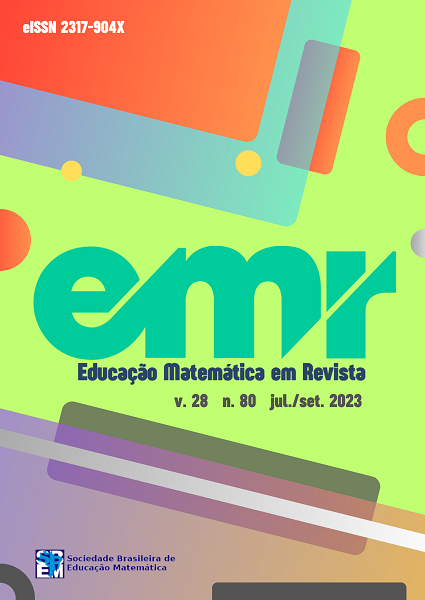The Generalization of Mathematical Patterns with Students of the 7th year of Elementary School
Keywords:
Generalizations of Patterns, Algebraic Thinking, Elementary SchoolAbstract
This article is an excerpt from a master's research study in the Graduate Program in Teaching, Basic Education, and Teacher Training at the Federal University of Espírito Santo. The aim was to answer the question: How do elementary school students generalize mathematical patterns and develop algebraic thinking? To do so, the objective was to investigate how elementary school students generalize mathematical patterns and develop algebraic thinking. A qualitative research design, specifically a case study, was conducted with seven 7th-grade students from a public school in the southern region of Espírito Santo. To collect data, the students solved tasks associated with the generalization of patterns taken from the textbook. The analyses indicate that the students used recursive and multiple difference strategies, with and without adjustment, to generalize the patterns. Furthermore, the presence of advanced mathematical thinking processes was observed in all resolutions.
Downloads
References
BARBOSA, A. C. C. A resolução de problemas que envolvem a generalização de padrões em contextos visuais: um estudo longitudinal com alunos do 2º ciclo do ensino básico. 2009. 484 f. Tese (Doutorado em Estudo da criança) - Programa de Pós-Graduação em Estudos da criança, Universidade do Minho, Portugal, 2009.
BARBOSA, A.; VALE, I. Visualization in pattern generalization: Potential and
Challenges. Journal of the European Teacher Education Network, v. 10, p. 57-70, 2015.
BLANTON, M.; KAPUT, J. Characterizing a classroom practice that promotes algebraic reasoning. Journal for Research in Mathematics Education, v. 36, n. 05, p. 412-446, 2005.
BOGDAN, R. C.; BIKLEN, S. K. Investigação qualitativa em educação: uma introdução à teoria e aos métodos. Porto: Porto, 1994.
BRASIL. Ministério da Educação. Base Nacional Comum Curricular. BrasÃlia, 2018. DisponÃvel em http://basenacionalcomum.mec.gov.br. Acesso em: 14 out. 2021.
CARDOSO, M. T. P. O conhecimento matemático e didáctico, com incidência no pensamento algébrico, de professores do primeiro ciclo do ensino básico: que relações com um programa de formação contÃnua? 2010. 587 f. Tese (Doutorado em Estudos da Criança) - Programa de Pós-graduação em Estudos da Criança, Universidade do Minho, Portugal, 2010.
DREYFUS, T. Advanced mathematical thinking processes. In: TALL, D. Advanced mathematical thinking. New York: Kluwer Academic Publishers, 2002. p. 25-41.
FIORENTINI, D.; MIORIM, M. A.; MIGUEL, A. A contribuição para repensar... a educação algébrica elementar. Pro-posições, São Paulo, v. 4, n. 1, p. 78-91, 1993.
GIOVANNI JÚNIOR, J. R.; CASTRUCCI, B. A Conquista da Matemática. São Paulo: FTD Educação, 2018.
GUALANDI, J. H. Os reflexos de uma formação continuada na prática profissional de professores que ensinam matemática. 2019. 169 f. Tese (Doutorado em Educação Matemática) – Programa de Pós-graduação em Educação Matemática, PontifÃcia Universidade Católica, São Paulo, 2019.
KAPUT, J. J. Teaching and learning a new algebra with understanding. National Center for Improving Student Learning and Achievement in Mathematics and Science, Massachusetts, p. 1-34. 2000. DisponÃvel em: https://eric.ed.gov/?id=ED441662. Acesso em 27 set. 2022.
KIERAN, C. Algebraic Thinking in the Early Grades: What is it? Mathematics Educator, v. 8, n. 1, p. 139-151, 2004.
LIMA, G. L.; BIANCHINI, B. L. Ãlgebra como integrante da cultura matemática do cidadão. In: GUALANDI, J. H. Ensino de matemática: desafios e possibilidades. Curitiba: Bagai, 2021. p. 10-28.
LINS; R. C.; GIMENEZ, J. Perspectivas em aritmética e álgebra para o século XXI. 4 ed. Campinas: Papirus, 2001.
MASON, J. Expressing generality and roots of algebra. In: BEDNARZ, N.; KIERAN, C.; LEE, L (Orgs.). Approaches to algebra. Dordrecht: Kluwer, 1996. p. 65-86.
PONTE, J. P. Estudos de caso em educação matemática. Bolema, v. 19, n. 25, p. 1-23, 2006. DisponÃvel em: https://www.periodicos.rc.biblioteca.unesp.br/index.php/bolema/article/view/1880. Acesso em 20 jun. 2022.
PONTE, J. P.; BRANCO, N.; MATOS, A. Ãlgebra no ensino básico. Lisboa: DGIDC, 2009.
STACEY, K. Finding and Using Patterns in Linear Generalising Problems. Educational Studies in Mathematics, v. 20, n. 2, p. 147-164, 1989.
TALL, D. The psychology of advanced mathematical thinking. In: _______. Advanced mathematical thinking. New York: Kluwer Academic Publishers, 2002. p. 3-20.
VALE, I. et al. Os Padrões no Ensino e Aprendizagem da Ãlgebra. In: VALE, T.; PIMENTEL, A.; BARBOSA, L.; FONSECA, L. CANAVARRO, P. Números e Ãlgebra. Lisboa: SEM-SPCE, 2006, p. 193-211.
VALE, I. Padrões em contextos figurativos: um caminho para a generalização em matemática. Revemat, Florianópolis, v. 08, n. 2, p. 64-81, 2013. DisponÃvel em: https://periodicos.ufsc.br/index.php/revemat/article/download/1981-1322.2013v8n2p64/26020/106402. Acesso em 29 jul. 2022.
VALE; I.; BARBOSA, A. Pensamento algébrico: contributo da visualização na construção da generalização. Educação matemática pesquisa, São Paulo, v. 21, n. 03, p. 398-418, 2019. DisponÃvel em: http://dx.doi.org/10.23925/1983-3156.2019vol21i3p398-418. Acesso em 28 out. 2022.
Downloads
Published
Issue
Section
License

This work is licensed under a Creative Commons Attribution-NonCommercial-ShareAlike 4.0 International License.



